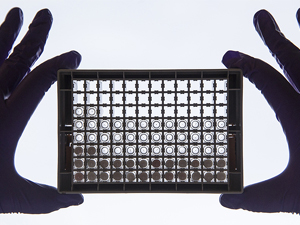



Date:08/08/16
 Japanese doctors have for the first time used artificial intelligence (AI) to detect a type of leukemia, which helped to save a patient's life as the disease had gone undetected using conventional methods.
Japanese doctors have for the first time used artificial intelligence (AI) to detect a type of leukemia, which helped to save a patient's life as the disease had gone undetected using conventional methods.
The University of Tokyo's Institute of Medical Science has successfully employed the new method of diagnosis, which includes a computer programme capable of analysing a huge volume of medical data, Arinobu Tojo, a member of the medical team, told Efe news on Friday.
The system, named Watson and jointly developed by the US' IBM and other firms, concluded that the patient concerned suffered from a rare type of leukemia after the patient's genetic information was compared with 20 million clinical oncology studies.
The patient, a 60-year-old woman, was initially diagnosed with acute myeloid leukemia, which she was unsuccessfully treated for with several different anti-cancer drugs, leaving doctors confounded, Tojo said.
Consequently, the medical team decided to use the Watson system, which, on analysing the data available, concluded the patient suffered from another form of leukemia and recommended a different treatment which was successful.
The conventional method of diagnosis for different types of leukemia is based on an evaluation by a team of medical specialists after studying the genetic information of patients as well as the clinical studies available; an enormous task owing to the huge amount of data to be gone through.
Artificial intelligence used to detect rare leukemia type in Japan
 Japanese doctors have for the first time used artificial intelligence (AI) to detect a type of leukemia, which helped to save a patient's life as the disease had gone undetected using conventional methods.
Japanese doctors have for the first time used artificial intelligence (AI) to detect a type of leukemia, which helped to save a patient's life as the disease had gone undetected using conventional methods.The University of Tokyo's Institute of Medical Science has successfully employed the new method of diagnosis, which includes a computer programme capable of analysing a huge volume of medical data, Arinobu Tojo, a member of the medical team, told Efe news on Friday.
The system, named Watson and jointly developed by the US' IBM and other firms, concluded that the patient concerned suffered from a rare type of leukemia after the patient's genetic information was compared with 20 million clinical oncology studies.
The patient, a 60-year-old woman, was initially diagnosed with acute myeloid leukemia, which she was unsuccessfully treated for with several different anti-cancer drugs, leaving doctors confounded, Tojo said.
Consequently, the medical team decided to use the Watson system, which, on analysing the data available, concluded the patient suffered from another form of leukemia and recommended a different treatment which was successful.
The conventional method of diagnosis for different types of leukemia is based on an evaluation by a team of medical specialists after studying the genetic information of patients as well as the clinical studies available; an enormous task owing to the huge amount of data to be gone through.
Views: 435
©ictnews.az. All rights reserved.Similar news
- Azerbaijani project to monitor disease via mobile phones
- Innovative educational system to be improved under presidential decree
- NTRC prolongs license of two TV and radio organizations for 6 years
- Azerbaijan establishes e-registry for medicines
- Azerbaijani museum introduces e-guide
- Nar Mobile opens “Nar Dunyasi” sales and service center in Siyazan city
- International conference on custom electronic services held in Baku
- OIC secretary general to attend COMSTECH meeting in Baku
- Azerbaijan develops earthquake warning system
- New law to regulate transition to digital broadcasting in Azerbaijan
- Azerbaijani State Social Protection Fund introduces electronic digital signature
- Intellectual traffic management system in Baku to be commissioned in December
- Tax Ministry of Azerbaijan started receiving video-addresses
- World Bank recommends Azerbaijan to speed up e-service introduction in real estate
- Azerbaijan to shift to electronic registration of real estate





















